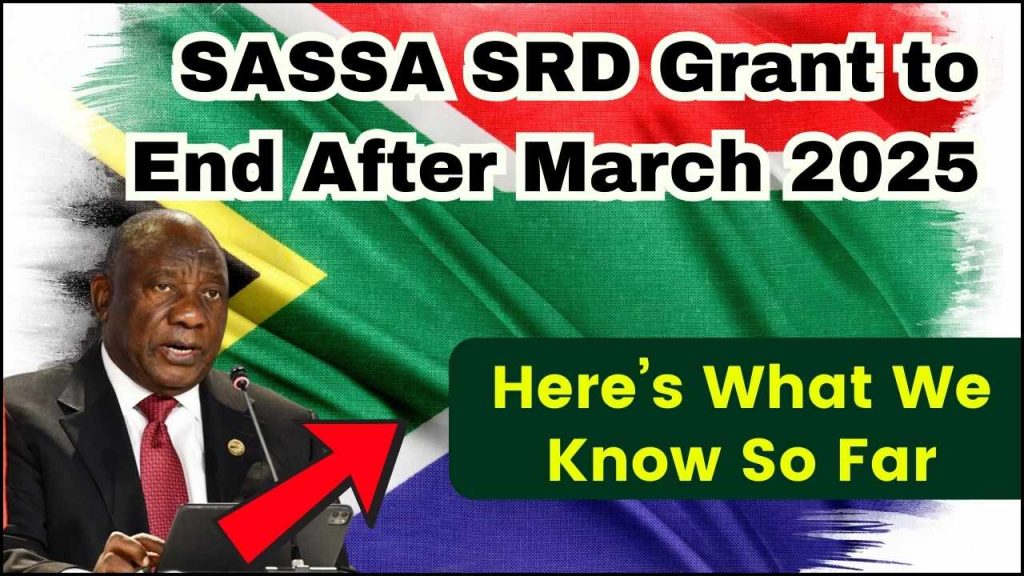
SASSA SRD Grant to End After March 2025: The South African Social Security Agency (SASSA) Social Relief of Distress (SRD) grant has been a lifeline for millions of unemployed and financially vulnerable South Africans. However, with the grant set to conclude in March 2025, many beneficiaries are left wondering about its future and their financial stability. Let’s explore what we know so far and what beneficiaries should prepare for in detail.
SASSA SRD Grant to End After March 2025
| Topic | Details |
|---|---|
| What is the SRD Grant? | A temporary financial assistance grant of R350/month, introduced during the COVID-19 pandemic. |
| Current Status | Extended until March 2025 with an increase to R370 per month starting in 2024. |
| Future Beyond March 2025 | Uncertain; depends on sustainable funding and potential government strategies. |
| Alternative Plans | Transition to job creation programs with R3.4 billion allocated for employment initiatives. |
| Official Resource | SASSA Official Website |
The SASSA SRD grant has been a crucial safety net for millions of South Africans, providing much-needed financial relief during challenging times. While it will continue until March 2025, its future beyond that remains uncertain. Beneficiaries are encouraged to stay informed, explore alternative support options, and actively participate in employment and skills development programs. The government’s shift toward sustainable economic solutions reflects a broader vision of empowerment and resilience, paving the way for long-term growth.
What Is the SASSA SRD Grant?
The SRD grant was introduced in 2020 as a response to the economic challenges posed by the COVID-19 pandemic. Its purpose was to provide temporary relief to individuals who were unemployed and not receiving any other form of social grant or unemployment insurance.
Initially set at R350 per month, the grant has undergone multiple extensions due to its widespread impact. In 2024, an additional allocation of R1.6 billion will increase the monthly amount to R370, acknowledging the ongoing financial pressures faced by beneficiaries. The SRD grant has provided a safety net for individuals during economic downturns and periods of uncertainty, making it one of the most impactful government interventions in recent history.
Why Is the SRD Grant Ending in March 2025?
The SRD grant’s current extension is part of the government’s Medium-Term Budget Policy Statement (MTBPS). According to Finance Minister Enoch Godongwana, extending the grant beyond March 2025 would require sustainable revenue streams. The cost implications of maintaining the grant are substantial, with billions already allocated annually to support the program.
While provisional allocations exist for 2025/26 and 2026/27, the grant’s future is not guaranteed. Key discussions within the government revolve around the need for long-term strategies that address unemployment and poverty more effectively. The focus is gradually shifting from direct financial aid to employment creation initiatives, aimed at fostering economic resilience and reducing dependency on social grants.
How Will This Impact Beneficiaries?
If the SRD grant ends without replacement or continuation, the 9.5 million beneficiaries who rely on it will face significant challenges. Many of these individuals are already struggling to meet basic needs, and the loss of this vital income could exacerbate poverty levels.
Recognizing this, the government is prioritizing employment programs and alternative forms of social support to bridge the gap. However, the transition will require time and active participation from stakeholders at all levels.
Practical Advice for Beneficiaries
- Stay Updated: Monitor official announcements from SASSA and government channels for the latest information on the SRD grant and related programs.
- Budget Wisely: Plan ahead by saving where possible and reducing unnecessary expenses. Preparing financially can help ease the transition if the grant ends.
- Explore Opportunities: Seek information on job creation programs, community initiatives, and other grants that may become available. For example, the Expanded Public Works Programme (EPWP) and Skills Development Grants could provide alternative forms of support.
Government’s Strategic Shift to Job Creation
The government’s MTBPS outlines a transition from social grants to sustainable employment opportunities. This shift aims to address unemployment at its core by providing individuals with the tools and opportunities they need to become economically self-sufficient. For the 2024/25 fiscal year, R3.4 billion has been allocated for employment programs. These initiatives aim to tackle unemployment through multifaceted approaches:
1. Public Employment Initiatives
Programs under this category aim to create jobs in sectors such as infrastructure development, education, and healthcare. By investing in public services and infrastructure, the government hopes to generate employment while addressing broader societal needs.
2. Skills Development Programs
Training initiatives, such as those provided by the Sector Education and Training Authorities (SETAs), aim to equip individuals with in-demand skills. Fields like technology, renewable energy, and construction are expected to play a central role in upcoming training programs.
3. Small Business Support
Supporting entrepreneurship is another critical component of the government’s strategy. Funding, mentorship, and networking opportunities are being made available to empower small business owners and startups. The Small Enterprise Development Agency (SEDA) is actively working to provide these resources.
Steps to Prepare for March 2025
- Verify Your Status: Regularly check your SRD grant status through the SASSA SRD Portal to ensure your payments continue without disruption.
- Research Alternative Support: Explore other government grants, such as the Child Support Grant, Disability Grant, or Old Age Pension. Each grant has specific eligibility requirements and benefits.
- Upskill Yourself: Enroll in skills development courses offered by SETAs and local organizations to enhance your employability.
- Seek Employment: Participate in community employment drives, job placement agencies, or government-supported employment initiatives. Networking and proactive engagement can significantly improve job prospects.
- Participate in Public Programs: Keep an eye on announcements about public employment programs and training workshops in your area.
FAQs About SASSA SRD Grant to End After March 2025
1. Will the SRD grant be extended beyond March 2025?
Currently, there is no confirmation. The government’s decision will depend on available revenue sources, budget priorities, and ongoing evaluations of the grant’s impact.
2. How can I check my SRD grant status?
You can check your status on the official SASSA SRD Portal by entering your ID and cellphone number. Regular checks can help ensure uninterrupted payments.
3. Are there other grants available?
Yes, SASSA offers a range of grants, including the Child Support Grant, Disability Grant, and Old Age Pension. Additional support programs are also available for education and housing.
4. What are the government’s plans for job creation?
The government has allocated R3.4 billion for job creation programs, focusing on public employment, skills training, and support for entrepreneurs.
5. How do I apply for job creation programs?
Details of these programs will be announced by government departments and local municipalities. Follow official platforms, such as municipal websites and government newsletters, for updates.











